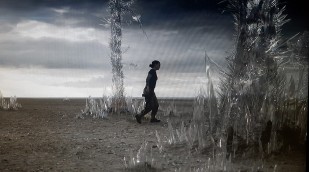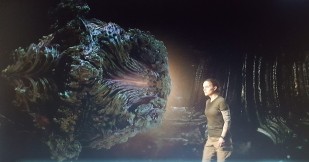 ast week while on lockdown (an example, perhaps, of the incompatibility of science
with political logic, for reasons I'll get to in some later article), just to take a
break from reading another book on the Klein-Gordon equation I watched a movie
called Annihilation.
ast week while on lockdown (an example, perhaps, of the incompatibility of science
with political logic, for reasons I'll get to in some later article), just to take a
break from reading another book on the Klein-Gordon equation I watched a movie
called Annihilation.
I must admit the final credits were well done: the producers' names were shown over a background of interesting changing swirly colors. For me it was the high point of the movie, mostly because it signaled that this dreadful movie was finally over.

The best scene in the movie
There will be spoilers below, but they don't matter because the movie itself tells us several times how it's going to end. The main character, Lena, played by Natalie Portman, is kidnapped by the US military and taken to a base next to the site where a meteor has smashed into a lighthouse. The lighthouse is now surrounded by a colorful shimmering cloud. The cloud and lighthouse are now strictly quarantined. Two previous expeditions, all men, have failed to return, so an all-girl team from the military base, including Lena, a biologist, goes in on foot to investigate.
For some inadequately explained reason the women immediately get amnesia and their radios don't work, so they can't figure out how to get out of the cloud, but they have a map so they decide to go to the lighthouse. Everything has mutated: plants grow into bizarre shapes, people turn into trees or wild animals, and giant mutated mold is growing everywhere. Thanks to video cameras conveniently left behind by the previous expedition, they discover that they had all died in some horrific way. One by one, bad things happen to the women as well: one is eaten by a mutant alligator, one changes into a tree, one is killed by a mutant bear with a human voice, and another goes missing.
The movie informs us in advance that Lena will be the only survivor through flash-forwards of her being debriefed back at the base.

Natalie Portman encountering mutated trees and bushes in Annihilation
The idea, as far as I can tell, was that Lena was the only one who had something to live for. We're shown this by flashbacks of her having sex with a variety of different men. The other women all were trying to escape something, whether it was spousal abuse or personality problems. Lena finds a microscope and notices that her own cells are mutating, exactly like the cancer cells she was miseducating her students about back in the real world except more colorful, seriously apoptotic, and highly motile, as if filmed in time-lapse by a special effects guy who had no clue about how real cells behave.
After reaching the lighthouse, Lena enters it and encounters the alien, which resembles a giant cloud of gray mold. A drop of her blood gets sucked into the cloud and the cloud creates a duplicate of her. Armed with one of those special military M16s that never runs out of ammunition, she shoots the duplicate repeatedly, then gives it a phosphorus grenade. The grenade detonates but the duplicate is unharmed.

Natalie Portman encountering an enormous bathtub clog in Annihilation
Then, for no apparent reason, the mold disappears, the lighthouse blows up, and the mutated trees disintegrate. Lena escapes with only a few minor scratches. She tells the military guys she has absolutely no clue what was happening, whether the alien was intelligent, where it came from, or whether it had any purpose. Then in the last scene we discover that she is actually either a duplicate or a mutant, but we never find out for sure, nor do we discover its purpose.
So, what's this movie about? All the characters are basically cardboard cutouts, so it's more like a video game than a movie. It's certainly not “too intellectual” or thought-provoking. If there's a message about the human propensity for self-destruction, I missed it.
The problem with movie was that the writer was afraid to tell the story that was inherent in the plot, which was that the woman goes into the cloud determined to discover what happened to her husband, and then shares the same horrific fate and dies by his side.
That would have been too grim, so instead all the audience can do is dissect the technical gimmicks that were added because otherwise there'd be no plot. Examples: Why is there no off-switch on the holodeck in Star Trek The Next Generation? Because. Why didn't the wormhole in Sliders take the kids back to their original world? Because. In this movie, why didn't they go in with a helicopter or a jeep? Because. Why didn't they fall back when they realized they were in over their heads? Why did the giant bathtub clog turn people into trees when its purpose was to make duplicates? Why did it blow up? This is what's left when the writer realizes the story is too awful to tell: just modern art, and that's what the movie tries to be.
Maybe what the movie was telling us is that if some mold starts growing somewhere, you better clean it off before it gets out of control. It's a sort of morality tale telling us how important it is to keep your bathtub clean. If you don't, the mold gets on the walls and the ceiling and makes quite a mess.
Now we know why they sent the women in.
At first I thought this movie was going to be like Darwinia, which starts out similarly. In that book it turns out that the entire world is not real but a computer simulation that had gotten infected by a computer virus, and the sole surviving character has to choose whether to escape or die in the simulation as he was supposed to.
But it turned out to be a premonition of some virus that smashed onto our shores and turned us into something we never thought we'd ever become: victims of biological agents which our public health officials knew about but failed to prepare for. We're the ones who got quarantined. Why? Because.
If they had released this movie now, after the Wuhan coronavirus, it would have been a smash hit. On second thought, no, it still would have bombed.
Next week: Cats.
apr 22 2020, 4:24 am
